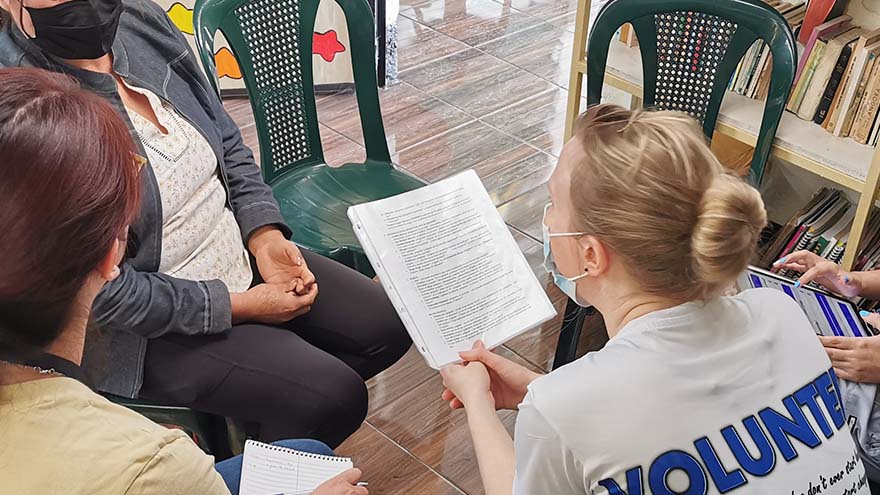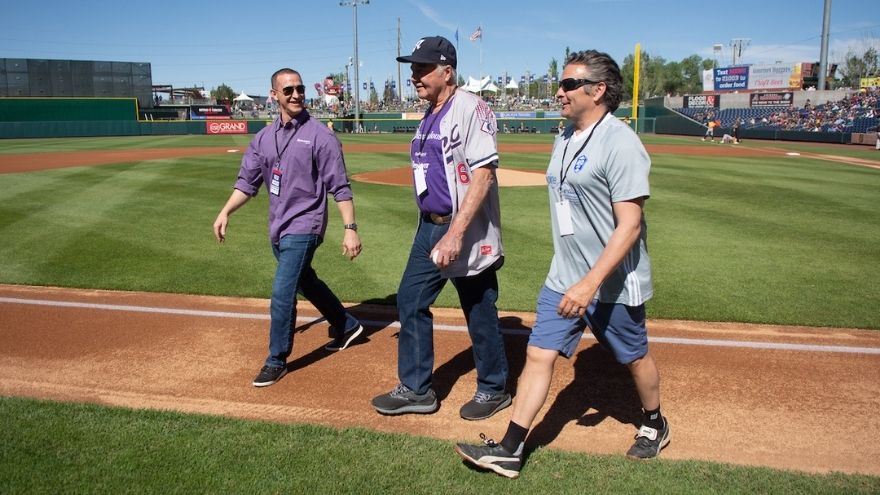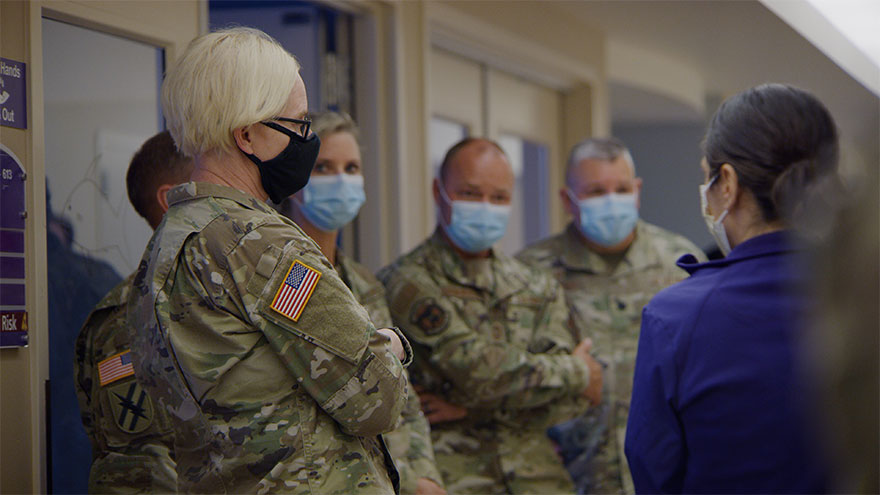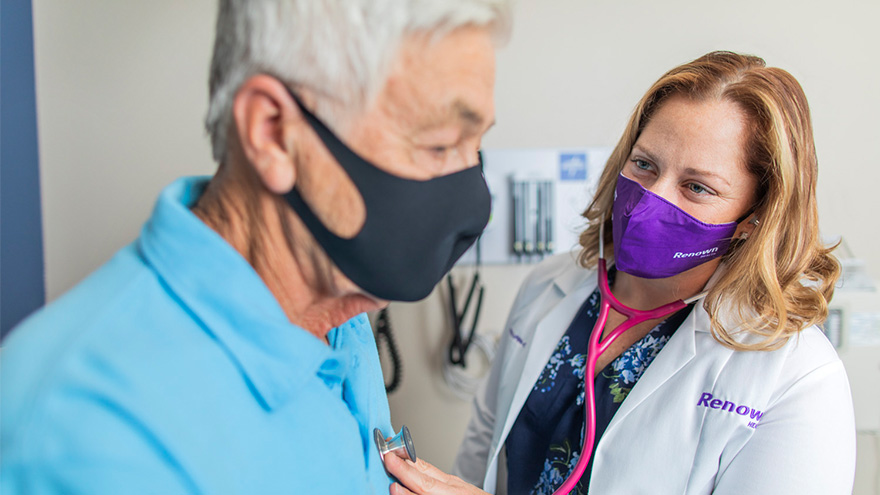Buscar
-
Diabetes tipo 2: Lo que debe saber
Type 2 diabetes, formerly known as adult-onset diabetes, is on the rise for adults and children in the United States. Although genetics play a role, you can take steps today to lower your risk of developing this life-altering condition. Michael Raymund Gonzales, MD with Renown Endocrinology answered our questions about Type 2 diabetes and gave us some useful tips for prevention. What effect does diabetes have on the body? And who’s most at risk? First, it’s important to know the difference between the two most common types of diabetes: Type 1 diabetes is the result of the body’s inability to make insulin, which is a hormone your body needs to be able to use sugar, or glucose, for energy. Type 1 is not preventable, and people who have it were either born with it or they developed it later in life due to an autoimmune process that attacked the pancreas that went unrecognized. Type 2 diabetes occurs when the body makes the insulin hormone, but it might not make enough or work well enough for the body to use sugar for energy. This is called insulin resistance. This condition usually develops later in life but is preventable with proper diet, exercise and weight loss. However, due to the obesity epidemic, type 2 diabetes is occurring more often in younger individuals. Diabetes hurts the body’s ability to break down glucose, so rather than it being used for energy, glucose stays in the bloodstream, which can cause problems. But with early detection and the help of your doctor, diabetes can be managed so that complications are avoided. Left unmanaged, however, diabetes can affect major organs and lead to heart and blood vessel disease, nerve damage, kidney damage, eye damage, skin conditions and more. Type 2 diabetes also results from risk factors that you can’t control, including your family history, race and age. However, there are a few risk factors that you can watch out for, such as being overweight, inactivity, diet choices, having high blood pressure and high cholesterol and triglycerides.
-
3,000 Miles Away But Close to Home
Overcoming poverty is not a task of charity, it is an act of justice. Like slavery and apartheid, poverty is not natural. It is man-made and can overcome by the actions of human beings. Sometimes it falls on a generation to be great. You can be that great generation. Let your greatness bloom. – Nelson Mandela, February 2005, Make Poverty History Campaign in London Lifting away the curtain that symbolized the front door, I entered a dark, cinderblock room and instantly became overwhelmed by an unpleasant odor. Working with oncology patients as a Child Life Specialist and an Occupational Therapist for over ten years, I recognized that smell. I had arrived in Guatemala – more than 3,000 miles from Reno – and it was my first day of a week-long trip where I would be serving alongside physicians in low-income communities providing free medical care for residents. My name is Brittany Jemmoua, I am an occupational therapist at Renown, and I recently volunteered with Kalan Kuxtal, a non-profit Guatemalan organization. I served alongside physicians by providing free primary care mobile clinics and home visits. The care we provided focused on prevention, intervention, education and lifestyle/medication management as we partnered with local entities, such as fire stations, community centers and schools to transform hundreds of lives. Speaking in both English and Spanish, I collected patient intake information, performed exams, tested for diabetes, and collaborated on a diabetes research project focused on daily risk assessment. Beyond these tasks, I immersed myself in the culture and learned more from the Guatemalan people than I could have ever imagined. Similar to Renown, Kalan Kuxtal Operates with Community at its Core Kalan Kuxtal, a Mayan expression meaning “life guardian,” is different from other volunteer medical trip organizations, and I took home valuable insights and lessons from their way of life that I now consider daily in my practice at Renown. I expanded my knowledge about diabetes, hypertension, pharmacology, infectious diseases, pregnancy complication, vector-borne illness and tuberculosis. We conducted home visits for socially neglected populations rather than expecting everyone to come to our clinics. I found that being welcomed into people’s homes gives you a different lens in which to view how their medical diagnoses interact with living conditions, occupations, and quality of life. This is when I met Mercedes and her mom. Her mom, Ms. Valencia, had jaundice skin and a substantial Basal Cell Carcinoma aggressively protruding from her face that impacted eating, hearing, seeing, sleep and social interactions. This opportunity to serve within their home led to an important palliative care conversation that would have been missed had we stayed in the clinic. We combed the rural neighborhoods assessing people’s risk for diabetes, taking glucose tests and educating families about their next steps. Many individuals had uncontrolled diabetes and misunderstandings regarding basic health management strategies. At the end of the day, many people demonstrated feelings of empowerment by actively offering solutions regarding how they will manage their day-to-day glucose with diet and exercise. Small actions can lead to big changes, and in the long-term, these health actions can help them avoid medication costs and focus on affording basic life necessities, such as water and electricity. Kalan Kuxtal organized a cultural day that included going to local businesses and community leaders to learn more about how they support the people of Guatemala. For example, Valhalla Macadamia Farm’s main goal is to help communities gain access to income, employment, and improved wellbeing by donating macadamia trees to families to grow and then sell macadamia products. A Weeklong Trip with Lifelong Impacts Each patient made a lasting impact on me, both personally and professionally. One specific family I saw in the clinic had a unique situation in that their two-year-old daughter, Margareth Elizabeth Cifuentes Bautista, was laboriously diagnosed with irregular corneal syndrome associated with glaucoma of congenital origin. Due to Guatemala’s limited prenatal screens and interventions, Elizabeth is nearly blind. While highly spirited and happy, she trips, bumps and feels her way through life. One barrier to her healthcare access is that her hard-working parents remain well below the poverty line, making less than $900/month. I am working to connect them with generous US Ophthalmologists and pediatric eye specialists to explore how we might save her sight and help her family. Their biggest dream is that she could recover her eyesight. “I know that this is not a life-threatening situation, but it is still something that never stops hurting me,” Jorge Cifuentes, Elizabeth’s father, said. “Unfortunately, our situation here is very hard. This country [Guatemala], although beautiful, it is very difficult to get ahead. We are people living in underprivileged conditions which complicates our situation even more. However, we are still trying to thrive by being kind and hardworking people. Thank you for helping us.” I have had the privilege of an opportunity for education, access to healthcare, employment and am aware that inequity and injustice prevail. This experience reinforced my understanding that medicine is a physically and mentally demanding profession that requires a commitment to service, continuous learning and adaptation both on local and global scales. I encourage everyone to please join me in serving the underserved by volunteering. Brittany is an experienced Occupational Therapist at Renown and volunteers with Kalan Kuxtal and other entities, such as The Robert Unsworth Foundation and Rock Steady Boxing to elevate communities. She loves being an Occupational Therapist; however, her life experiences confirm that her true calling is to become a physician. She is currently applying to medical school. Brittany is eager to earn the responsibility to improve lives and communities as their engaged physician. Brittany is tentatively scheduled to return to Guatemala at the end of this year to continue partnering with the people for a better future. You are welcome to join!
-
Make Hydration a Priority for Your Health
As the temperatures skyrocket and we return to more outdoor activity, one thing is certain: you must hydrate to stay cool, healthy, and functional. But how much water do you need, and what are some easy ways to ensure you are getting enough? Aurosis Reddy, DO a family medicine provider with Renown Medical Group, shares what you need to know. How Much Water Is Enough? Experts agree that recommended daily water intake can vary depending on different factors such as your weight, metabolism, location, diet, physical activity, and health. As a rule of thumb, women should aim for a daily fluid intake of 91 ounces, and men should aim for 125 ounces. It is important to listen to your body and recognize when you might need to increase your water intake. For example, if you’re partaking in strenuous exercise, or spending time outside in the heat, you’ll want to give your body more water and electrolytes to function properly. How Can I Tell If I Am Dehydrated? Decreased coordination Fatigue Less urination Dizziness Dry, sticky lips and mouth Increased thirst Headache
-
Dave's Story: How One Ranger Drove On
Meet Dave Pierson and his Wife Kathy Dave Pierson, 73, and his wife Kathy were just ten days away from a celebratory retirement trip to Africa in May 2021 when severe leg pain and discomfort landed Dave in the Veterans Administration (VA) Hospital. Unbeknownst to the couple, they would not be making the trek to Africa, and it would be several weeks before Dave would be back home with his wife in Carson City, their life drastically different than before. It all happened so fast. After a prompt referral from the VA Hospital to Renown Regional Medical Center, Dave received treatment for a bacteremia infection and underwent emergency spine surgery due to an epidural abscess. However, once his surgeon Edward Perry, MD completed the emergency procedure at Renown Health, Dave learned there was still a long road ahead. He had extremely limited body function and would need to learn to walk again. A Husband, Baseball Fan and Veteran Until this emergency spinal cord surgery, Dave had lived an especially healthy life in his retirement, traveling the world with Kathy, taking photographs along the way and attending ball games for their beloved team, the Reno Aces. Dave, a Vietnam veteran, and Kathy planted their roots in Carson City surrounded by countless friends and family, eagerly awaiting Kathy’s retirement. The Long Road Ahead It was those same friends and family who remained by Dave’s side throughout his recovery process. At the advice of the Renown team, Dave began a personalized physical rehabilitation plan at Renown Rehabilitation Hospital just days after his initial surgery. It was with the help of Charles Krasner, MD, an Infectious Disease Specialist that Dave made a smooth transition to be cared for at the Rehabilitation Hospital. Dave spent six weeks of inpatient treatment relearning fundamental occupational skills and motor functions such as eating and drinking, getting dressed, using a wheelchair and eventually taking his first steps, aided by a walker. The couple proudly remembers a day at the Rehabilitation Hospital when Dave successfully buttoned up his shirt using a small apparatus designed to aid in the task. "It was a little thing, but it was a monumental thing," Kathy shared. Dave achieved physical and cognitive victories, both on a small and large scale, over the next six weeks. Kathy visited every day she could, always prepared with a photo of the couple's past travels to encourage Dave. The Rehabilitation Hospital staff grew close with the Piersons, sharing stories and photos of their dogs, travels and life. The nurses kept Kathy updated about her husband’s condition and prepared her for the journey to come, this included extensive education related to Dave’s future at-home care. Benjamin Pence, MD, Dave’s lead rehabilitation doctor and the Director of the Institute for Neurosciences, always seemed to know just how to motivate Dave on his most challenging days. As a ranger in Vietnam, the phrase, “drive on ranger” meant a lot to the veteran when it came to determination and perseverance. So, the phrase was used as encouragement by Dr. Pence and the Rehabilitation Hospital team throughout Dave’s journey, becoming a fond memory about hope and determination during recovery.
-
Meet Gabby, Renown Regional ER Nurse and Miss Rodeo Nevada
Renown Health is proud to embrace the Reno-Sparks culture that makes our community stand out, which is why we sponsor the Reno Rodeo, an early summer staple with roots in the community as deep as our own. One of our many ties with the Reno Rodeo includes Renown Regional’s own emergency room nurse and Miss Rodeo Nevada 2022, Gabby Szachara. A Reno native, Gabby developed a love for the Reno Rodeo at a very young age. “I loved watching the girls on the Reno Rodeo Flag Team when I was little and knew I wanted to be part of the Reno Rodeo someday,” said Gabby. “As I got older, I started to make connections and build relationships with some people in the rodeo scene, and they generously lent me their horses so I could participate in the Reno Rodeo Flag Team.” Gabby was on the flag team for three years before being crowned Miss Rodeo Nevada 2022 last year. Before joining the Reno Rodeo Flag Team, Gabby was a student at the University of Nevada, Reno, and a member of the women’s volleyball team. In December 2017, she graduated with a bachelor’s degree in public health. At first, Gabby was interested in a career in sports medicine – it made sense with her background in athletics. But, after working in the medical field as a certified nurse assistant and an emergency medical technician, she grew passionate about patient care and decided she wanted to become a nurse. “I’ve always loved teamwork and helping others,” said Gabby. “It’s important to me to be there for others, especially when it might be their worst day.” In December 2021, Gabby graduated from Truckee Meadows Community College with a nursing degree and joined Renown Health this February. “I love Renown for various reasons. Everyone here is so nice and welcoming, and there is a great team dynamic,” said Gabby. “And I love that Renown’s main color is purple because that is my favorite!” When Gabby isn’t in her scrubs and caring for patients, she is in western wear and carrying out her duties as Miss Rodeo Nevada. “I do a lot of traveling across the country to attend other rodeos,” said Gabby. “I enjoy meeting so many wonderful people and experiencing the culture of different states.” Gabby’s main goals as Miss Rodeo Nevada are to promote the western way of life, agriculture, rodeo and community benefit. In addition, she visits local schools to talk with kids about how they can get involved in these areas and inspires them to turn their dreams into reality. Gabby has a special place in her heart for the Reno Rodeo. “Reno is my home, and the Reno Rodeo is the heart and soul of summer in northern Nevada. Everyone comes together and dusts off their boots to have fun and also contribute money to important causes in our community,” said Gabby. “I love the comradery, the friendly and healthy competition and the great people.” If you’re going to the Reno Rodeo this weekend, watch for Gabby and her horse, “Torque.” And if you see Gabby in the halls at Renown Regional, give her a high-five for all her hard work as a nurse and Miss Rodeo Nevada!
Read More About Meet Gabby, Renown Regional ER Nurse and Miss Rodeo Nevada
-
Avoid Counterfeits and Find the Right Protective Mask with This Helpful Guide
To better protect our patients, visitors and employees, cloth masks are no longer allowed at Renown facilities. Surgical masks, KN95 and N95 masks are allowed at Renown facilities. Appropriate face masks will be provided for visitors and patients who need one. With recent surges in the infectious COVID-19 omicron variant, many have sought to upgrade their face masks. But, let’s face it, shopping for face masks with adequate protection can be a challenge, especially considering the countless variations and the rise of counterfeit masks. Follow our straightforward guide below which includes some common red flags to help you discern between a high-quality face mask that provides proper protection and those that may be counterfeit. Types of Masks Qualities of a Real N95 Respirator Mask According to the National Institute for Occupational Safety and Health (NIOSH), N95 approved masks form a tight seal around your face and include a disposable respirator that removes particles including bacteria, viruses and dust as you breathe. N95 masks that are NIOSH approved undergo strict quality assurance and performance requirements to ensure mask respirators filter out up to 95% of hazardous particles. As a rule of thumb, N95 masks will not have ear loops, commonly used in cloth or surgical face masks. N95 respirators will contain two elastic bands or head straps that fasten behind the head, one securing the crown of the head and the other resting at the base of the neck, providing a snug fit and seal. Some other common signs that an N95 might be counterfeit include lack of all proper labeling, misspellings of NIOSH, decorative fabric and claiming to be approved for children. Currently, masks in adult sizes are the only masks to undergo NIOSH’s quality assurance and testing process. Respirators approved by NIOSH will include a testing certification (TC) approval number and will contain specific labeling on the facepiece of your mask. Find a full list of Center for Disease Control (CDC) and NIOSH requirements here. Identifying Real KN95 Respirator Masks Often preferred due to comfortability, the KN95 respirators were initially designed to meet Chinese standards for medical masks. Firstly, if a KN95 mask claims to be approved by the CDC, it is counterfeit as the CDC and NIOSH do not support any respiratory protective devices according to international standards. However, when KN95 masks are fitted and worn appropriately they do provide more protection than disposable masks. Legitimate KN95 masks will display a manufacturer number, GB2626-2019, ensuring accordance with current Chinese respirator standards for all masks made after July 1, 2021. Unlike N95 masks, it is important to note that KN95 masks are available in children's sizes. You might run into KN95 masks claiming to be “FDA (Food and Drug Administration) approved” or “FDA-registered,” but be aware that this does not mean much and is a misleading statement. What this indicates is that a mask maker has submitted paperwork to the FDA, but the product has not been thoroughly tested for proper filtration and protection. Surgical Masks Medical procedure masks often referred to as surgical or disposable masks vary in their protection according to a variety of factors including fit and filtration. The CDC defines medical procedure masks as “variably shaped, including flat pleated, cone-shaped, or duck-bill. Medical procedure masks are loose and are not expected to provide a reliable level of protection against airborne or aerosolized particles as N95 respirators regulated by the National Institute of for Occupational Safety and Health.” However, these types of masks provide more protection than cloth masks and are certainly better than wearing no mask at all. Often popular due to their level of comfort and cost-effectiveness, surgical masks can be knotted in the ear loop areas to provide a tighter seal and can be layered for additional filtration. Depending upon your budget and level of comfortability and protection, one variation of mask may suit you over another. Please remember to do your part in limiting the spread of COVID-19 and wear a surgical mask, KN95 or N95 mask when visiting Renown facilities.
Read More About Avoid Counterfeits and Find the Right Protective Mask with This Helpful Guide
-
¿Son necesarios los lentes con filtro de luz azul?
Since the COVID-19 pandemic, more people are working from home than ever before, leading to a rise in digital screen time. Between spending eight or more hours staring at a computer screen, and some downtime hours spent looking at a smartphone or watching TV, it’s almost inevitable to feel some adverse effects at the end of a day. Blue Light Effects vs. Digital Eye Strain Blue light is all around us, and the most natural source comes primarily from sunlight. Other forms of blue light are artificial and emitted by digital screens including LED TVs, smartphones, tablets and computers. Surprisingly enough, research shows blue light can actually have health benefits such as promoting alertness, boosting memory and cognitive function, elevating mood and regulating circadian rhythm. However, studies indicate that an excess in blue light exposure can lead to depletion of melatonin production, a hormone that regulates our sleep cycles. In today’s eyewear industry, blue light glasses are one of the more popular items purchased by consumers. Companies who sell the glasses claim they help with reducing or eliminating digital eye strain, while also increasing natural melatonin secretion to get a good night’s sleep. Other than their slight yellow tint to filter out blue light, they mostly look like regular glasses and come in many different stylish frames. You can find blue light glasses through various eyewear retailers. Most adults have experienced digital eye strain. Common symptoms of digital eye strain include headaches, blurred vision, irritated eyes, and fatigue. Many believe that digital eye strain is caused by overexposure to blue light, but medical vision experts say that is not the case. “Digital eye strain is related to how we use our digital devices, not the blue light coming out of them,” says Mitchell Strominger, MD, a neuro and pediatric ophthalmologist with Renown Health. Do Blue Light Glasses Even Work? Since blue light glasses aren’t medically proven to help with digital eye strain, you’re probably wondering if they’re even worth using. “If you’re one to binge a TV show or scroll though social media before bedtime, the blue light from those digital screens can disrupt your circadian rhythm and cause you to lose sleep, which can ultimately lead to other adverse health effects,” says Dr. Strominger. “While more research is still needed, some studies have shown that blue light glasses may prevent melatonin suppression and increase quality of sleep. There is no harm in trying them out and seeing if they work for you.” As for preventing digital eye strain, Dr. Strominger shared several helpful tips: Try using the 20-20-20 rule, which entails looking away from your screen and looking at an object 20 feet away for at least 20 seconds. Sit at an arm’s length (about 25 inches) away from your screen. Adjust the brightness and contrast of your screen, especially before bedtime. There is a night mode setting on most smart phones you can use. Reduce your screen time whenever you can and give your eyes a break.
-
How to Navigate the Baby Formula Shortage
With the ongoing baby formula shortage in the United States, many parents are questioning how they can safely feed their babies and keep them healthy. Pediatrician Karen Wagner, APRN with Renown Medical Group answers some questions on what to do (and not to do) during this challenging time. What if I cannot find my baby’s formula in any stores or online retailers? If you run out of the formula you give your baby and are unable to find it through any trusted retailers, you should start by calling your baby’s pediatrician for recommendations on other safe feeding alternatives. Many pediatricians are advising that, as long as your baby has no special diet or medical needs, they can be switched to a different kind of FDA approved baby formula, if it’s purchased from a well-recognized distributor and not through an auction site or an individual you don’t know. It’s also important to make sure the formula is not expired, as it may no longer be safe or have the correct levels of nutrients. Can I make my own baby formula? Or can I dilute the formula I have? No, it is very dangerous to attempt making your own formula, as it can lead to infection and will not have the right amount of nutrients your baby needs to develop and grow. It’s also unsafe to dilute your formula supply, as doing so will cause a lack of nutrients which can lead to your baby having severe health issues down the road.
-
When Is It Time to See a Physiatrist
Physiatry (fi-zahy-uh-tree), also referred to as physical medicine and rehabilitation, encompasses the diagnosis, prevention and treatment of disabilities or injuries related to the brain, nerves, bones and muscles. The goal of this specialty is to maximize physical functioning, greatly decrease or eliminate pain, foster independence and improve quality of life for those suffering with a disability, chronic pain and physical impairments. Who Is It for? Physiatry can help patients with functional deficits and secondary medical conditions as a result of the following: Amputation Brain Injury Osteoarthritis Spasticity and Movement Disorders Spinal Cord Injury Spine Pain Sports-Related Injuries Stroke Some of these medical conditions can often cause chronic pain or impede physical functioning, ultimately affecting a person’s overall well-being and making it difficult for them to sustain a desired quality of life.
-
Renown & The National Guard: How These Employees Serve with Maximum Impact
Jason Farnsworth, Evan Fox and Jennifer Jenni are three of Renown’s more than 500 employees who currently serve, or who have served, in our miliary. Their deep-rooted passion for helping our community extends to the Nevada National Guard (NANG), an organization that shares many values with Renown. We sat down with Jason, Evan and Jenni to ask their perspective on what propels them to serve people in our home state and learn more about how Renown's partnership with the Nevada National Guard has supported their personal and professional growth. Meet Jason Farnsworth, the Face Behind Renown’s Partnership with the National Guard Jason Farnsworth is the Director of Respiratory Care Services at Renown and the Chief Master Sergeant, Medical Superintendent of the Nevada National Guard. He has been with the Guard and Renown for 23 years. Jason joined the Guard over 20 years ago to help pay for his college education. After using up his paid vacation time from Renown for Guard events like deployments or training in his initial years as a Guard member, Jason approached Renown senior leadership with the idea of paid military leave. “In full support of employees who choose to serve, Renown stepped up to give a resounding, ‘yes,’ as they have time and time again for our military community,” Jason said. From that day forward, policies were implemented at Renown to further support individuals who serve our country with paid military leave. As a result, Jason submitted an Employer Support of the Guard and Reserve (ESGR) Secretary of Defense Freedom Award nomination and Renown Health won the highest-level department of defense employer recognition in the nation. Since then, Jason has received four associate degrees, one bachelor’s degree and a master’s degree with the government’s support and has been promoted several times to his current roles at Renown and the Guard. “As I progressed at Renown, I was able to progress in the National Guard. They've complimented one another on leadership skills and clinical competencies.” How Evan Fox Finds Synergy in His Roles at Renown and the National Guard After five years as a cardiac intensive care unit (ICU) nurse at Renown Regional Medical Center and two years as a First Lieutenant Critical Care Nurse in the Guard, Evan Fox has implemented care plans for many community members and put his expertise to good use. The countless trauma hours he has completed at Renown have directly translated to the field as a Guard member. He states that “his roles are synergistic, and his innumerable hours of critical care are worth their weight in gold because of the transferability between the two positions.” Evan’s Roles Provide Service to Our Community, and Beyond Evan feels passionately that his experience with the Guard is unique because you live in the area that you serve, whereas with other military branches you are often stationed elsewhere. Recently, he’s cared for many people involved in firefighting missions in our surrounding areas. As a member of the medical group of the Nevada National Guard, Evan is prepared to provide critical care at any given moment in the event of deployment due to a natural or man-made disaster. He can provide critical care in our region and across the nation. How Jennifer’s Leadership Journey Continues to Grow Jennifer Jenni is the nurse manager of the cardiac ICU and intermediate care unit at Renown Regional Medical Center. She has been with Renown for 13 years and initially started at Renown South Meadows Medical Center in the general surgical unit. She felt compelled to take advantage of Renown’s development programs as she worked her way up to supervisor and now as a manager. She is also a registered nurse and captain in the Nevada National Guard as well as a member of an enhanced resource force team, equipped to provide aid anywhere in the nation in the event of a disaster. With Jennifer, People Always Come First Her dedication to serving people has always been a part of who she is, even before she became a leader. From an early age, Jennifer felt strongly that she wanted to be involved in the military in some way stating that “the Guard is very much a service to the people, whether it's our community or nationwide.” While her clinical leadership qualities and skills have translated well to her role as a captain, holding two leadership titles is no easy feat – especially when it comes to the continued training her roles require. However, because of the support Renown provides its military community, Jennifer was able to confidently attend officer training in Alabama last year. Jennifer was fully supported by her Renown team when she was away and took advantage of her paid military leave benefit. More Than Just a Partnership, but a Family Jason, Evan and Jennifer are among the many employees who choose to serve both here at Renown and in the Guard. You might see National Guard members who are also Renown employees in areas like the cardiac ICU, trauma ICU, emergency department or medics who work on hospital floors. “Not only is my family out at the National Guard, but they are also here at Renown. It’s amazing to see how many people spend their lives giving back,” Jason said.
Read More About Renown & The National Guard: How These Employees Serve with Maximum Impact
-
Primary Care vs. Urgent Care vs. The ER
When seeking medical care, there are several different provider types and options from which to choose. For example, you may have asked yourself a common question: Should I go to my primary care provider, urgent care or the emergency room? Sarah Herbert, APRN with Renown Medical Group – South Carson, provides guidelines to help you easily make this decision. When should you go to the Emergency Room (ER)? Making a visit to the ER should be reserved for severe symptoms and/or life-threatening conditions, including: Chest pain Severe shortness of breath or difficulty breathing Weakness or numbness on one side Slurred speech Fainting/loss of consciousness Continuous bleeding or major open wounds Severe allergic reactions Coughing or throwing up blood Drug or alcohol overdose Sharp pain in lower abdomen Severe dehydration and not responding to nausea medication (needing IV fluids) High fever that does not get better with medicine Serious burns Broken bones/dislocated joints Head trauma Find an Emergency Department Near You If you’re still unsure of where to go for appropriate medical care, it’s best to check with your primary care physician. And remember, for a life-threatening emergency, call 9-1-1 immediately!
-
Meditation: Give Yourself the Gift of Inner Peace
As we enter the holiday season, many of us are beginning to plan and partake in festivities such as shopping, cooking, baking, holiday parties and family gatherings. While the holidays often bring joy and cheer, the hustle and bustle can also lead to fatigue, stress, anxiety and sometimes depression. To avoid holiday burnout, it’s important to find ways to care for yourself mentally and physically. Galen Gorelangton, Renown's Spiritual Center Volunteer, discusses how yoga and meditation can benefit you. What is yoga and meditation? Yoga is defined as performing a series of postures and controlled breathing exercises to promote a more flexible body and a calm mind. As you move through poses that require balance and concentration, you're encouraged to focus less on your busy day and more on the moment. Meditation involves focusing or clearing your mind using a combination of mental and physical techniques. While there are many different types of meditation and yoga practices, they both share similar benefits including: Reduced stress Lower blood pressure Decreased anxiety and depression Increased energy Better sleep Lower inflammation and pain levels Improved strength, balance and flexibility Better focus and concentration And much more!
Read More About Meditation: Give Yourself the Gift of Inner Peace











